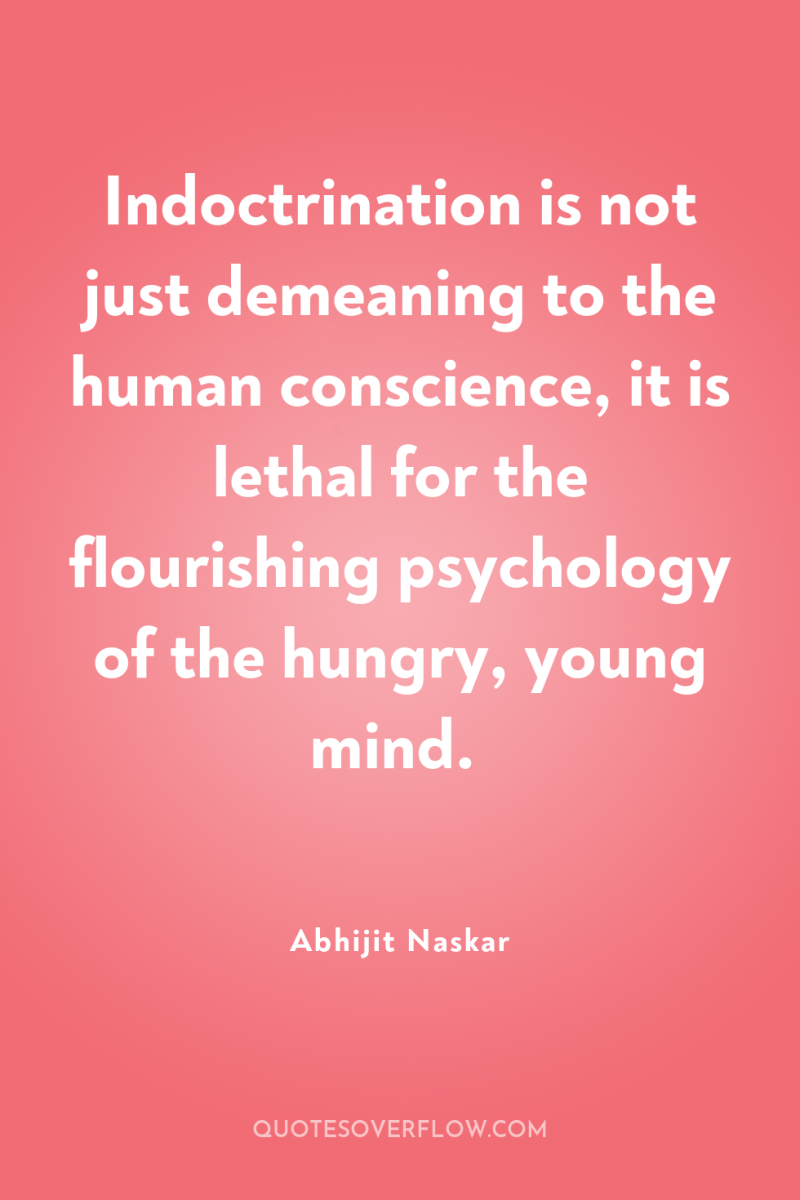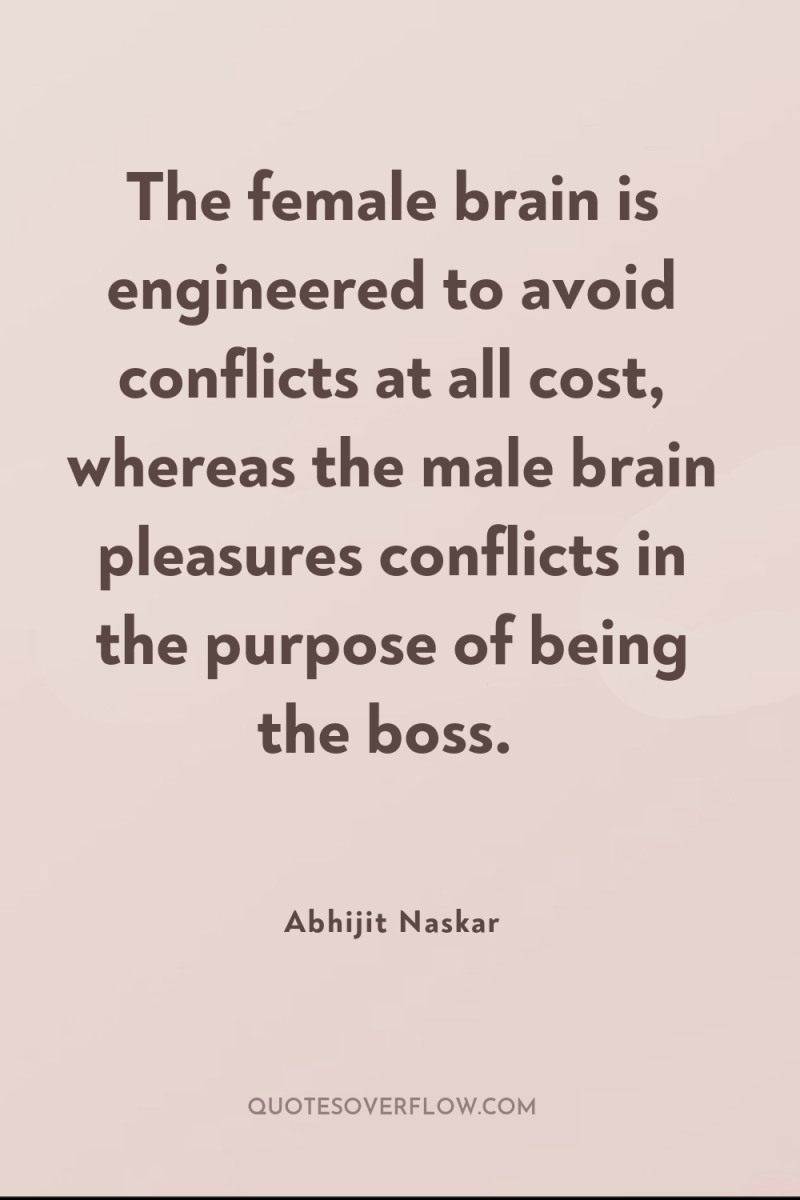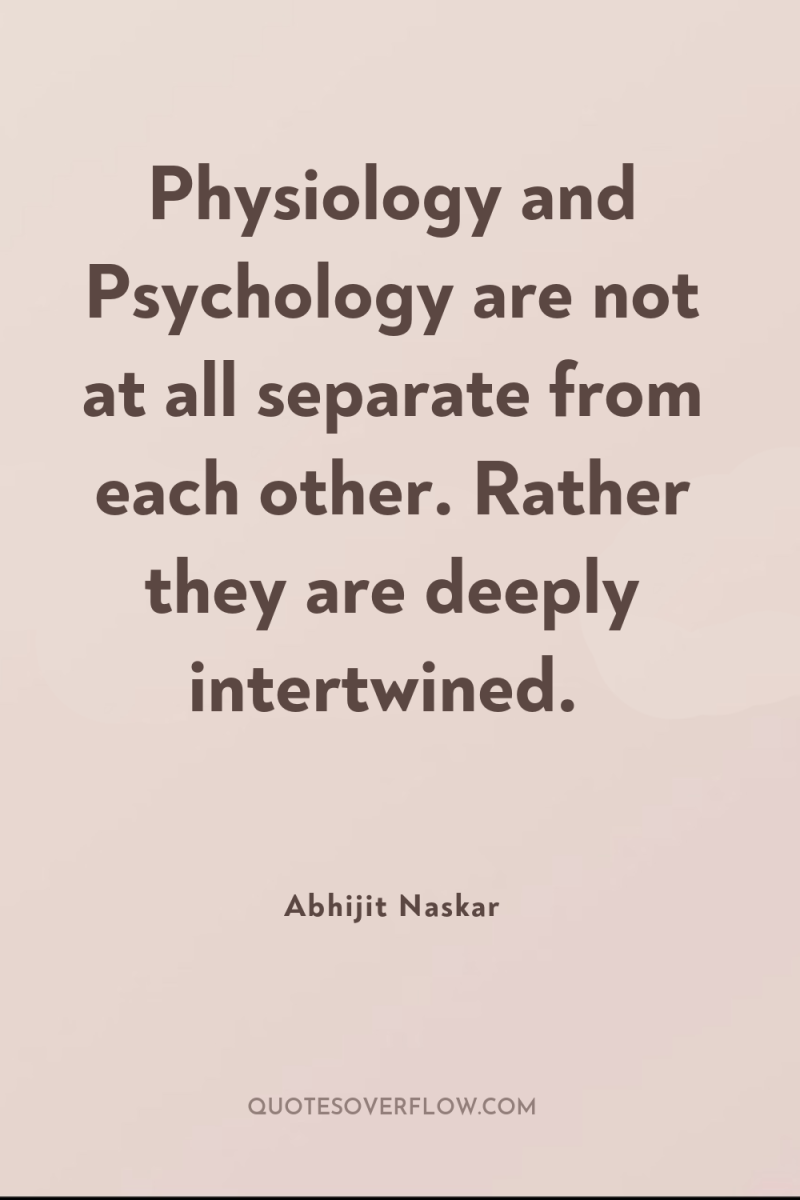1
The purpose of education should ultimately be the advancement of the species. And for this to actually happen, the world needs the kind of education by means of which character is formed, strength of the mind is increased and the human intellect is expanded beyond its own limits.Abhijit Naskar

2
Indoctrination is not just demeaning to the human conscience, it is lethal for the flourishing psychology of the hungry, young mind.Abhijit Naskar
3
All men either consciously or subconsciously crave for authority over their environment, especially over their peers in the society, male and female alike. Women on the other hand, crave for intimacy especially from their female peers in the society. Colloquially this is what you call “gossiping”.Abhijit Naskar

4
The female brain is engineered to avoid conflicts at all cost, whereas the male brain pleasures conflicts in the purpose of being the boss.Abhijit Naskar

5
Physiology and Psychology are not at all separate from each other. Rather they are deeply intertwined.Abhijit Naskar
6
Each of your brains creates its own myth about the universe.Abhijit Naskar
7
The causal, abstract, binary, holistic, and reductionist functions of the human brain all help you to process the enormous amount of information coming into our brain from the external world every day.Abhijit Naskar
8
In every walk of life, you do have the freedom to choose, but that freedom is based on the perception of the world and yourself which you have gained until that moment of life.Abhijit Naskar
9
Mindless action without a real understanding of the ramifications is only likely to result in serious miscalculations or a colossal waste of time. Avoid both by using your judgment, filtered through both knowledge and experience. Use common sense and logic as a counterbalance to emotion.David Amerland
10
Characteristics of System 1: - generates impressions, feelings, and inclinations; when endorsed by System 2 these become beliefs, attitudes, and intentions - operates automatically and quickly, with little or no effort, and no sense of voluntary control - can be programmed by System 2 to mobilize attention when a particular pattern is detected (search) - executes skilled responses and generates skilled intuitions, after adequate training - creates a coherent pattern of activated ideas in associative memory - links a sense of cognitive ease to illusions of truth, pleasant feelings, and reduced vigilance - distinguishes the surprising from the normal - infers and invents causes and intentions - neglects ambiguity and suppresses doubt - is biased to believe and confirm - exaggerates emotional consistency (halo effect) - focuses on existing evidence and ignores absent evidence (WYSIATI)- generates a limited set of basic assessments - represents sets by norms and prototypes, does not integrate- matches intensities across scales (e.g., size to loudness) - computes more than intended (mental shotgun) - sometimes substitutes an easier question for a difficult one (heuristics) - is more sensitive to changes than to states (prospect theory)* - overweights low probabilities* - shows diminishing sensitivity to quantity (psychophysics)* - responds more strongly to losses than to gains (loss aversion)* - frames decision problems narrowly, in isolation from one another* .Daniel Kahneman
11
Consciousness may be seen as the haughty and restless second cousin of morphology. Memory is its mistress, perception its somewhat abused wife, logic its housekeeper, and language its poorly paid secretaryGerald Edelman
12
Sound waves, regardless of their frequency or intensity, can only be detected by the Mole Fly’s acute sense of smell–it is a little known fact that the Mole Fly’s auditory receptors do not, in fact, have a corresponding center in the brain designated for the purposes of processing sensory stimuli and so, these stimuli, instead of being siphoned out as noise, bypass the filters to be translated, oddly enough, by the part of the brain that processes smell. Consequently, the Mole Fly’s brain, in its inevitable confusion, understands sound as an aroma, rendering the boundary line between the auditory and olfactory sense indistinguishable. Sounds, thus, come in a variety of scents with an intensity proportional to its frequency. Sounds of shorter wavelength, for example, are particularly pungent. What results is a species of creature that cannot conceptualize the possibility that sound and smell are separate entities, despite its ability to discriminate between the exactitudes of pitch, timbre, tone, scent, and flavor to an alarming degree of precision. Yet, despite this ability to hyper-analyze, they lack the cognitive skill to laterally link successions of either sound or smell into a meaningful context, resulting in the equivalent of a data overflow. And this may be the most defining element of the Mole Fly’s behavior: a blatant disregard for the context of perception, in favor of analyzing those remote and diminutive properties that distinguish one element from another. While sensory continuity seems logical to their visual perception, as things are subject to change from moment-to-moment, such is not the case with their olfactory sense, as delays in sensing new smells are granted a degree of normality by the brain. Thus, the Mole Fly’s olfactory-auditory complex seems to be deprived of the sensory continuity otherwise afforded in the auditory senses of other species. And so, instead of sensing aromas and sounds continuously over a period of time–for example, instead of sensing them 24-30 times per second, as would be the case with their visual perception–they tend to process changes in sound and smell much more slowly, thereby preventing them from effectively plotting the variations thereof into an array or any kind of meaningful framework that would allow the information provided by their olfactory and auditory stimuli to be lasting in their usefulness. The Mole flies, themselves, being the structurally-obsessed and compulsive creatures that they are, in all their habitual collecting, organizing, and re-organizing of found objects into mammoth installations of optimal functional value, are remarkably easy to control, especially as they are given to a rather false and arbitrary sense of hierarchy, ascribing positions–that are otherwise trivial, yet necessarily mundane if only to obscure their true purpose–with an unfathomable amount of honor, to the logical extreme that the few chosen to serve in their most esteemed ranks are imbued with a kind of obligatory arrogance that begins in the pupal stages and extends indefinitely, as they are further nurtured well into adulthood by a society that infuses its heroes of middle management with an immeasurable sense of importance–a kind of celebrity status recognized by the masses as a living embodiment of their ideals. And yet, despite this culture of celebrity worship and vicarious living, all whims and impulses fall subservient, dropping humbly to the knees–yes, Mole Flies do, in fact, have knees! –before the grace of the merciful Queen, who is, in actuality, just a puppet dictator installed by the Melic papacy, using an old recycled Damsel fly-fishing lure. The dummy is crude, but convincing, as the Mole flies treat it as they would their true-born queen. .Ashim Shanker
13
It is not about whether you have free will, rather it is about whether you have enough experience to make the best possible wilful decision in the current moment of life.Abhijit Naskar
14
The hormonal interplay inside a woman’s head creates her reality. Her hormones tell her day to day what’s important. They mold her desires and values.Abhijit Naskar
15
Cognitive science has something of enormous importance to contribute to human freedom: the ability to learn what our unconscious conceptual systems are like and how our cognitive unconscious functions. If we do not realize that most of our thought is unconscious and that we think metaphorically, we will indeed be slaves to the cognitive unconscious. Paradoxically, the assumption that we have a radically autonomous rationality as traditionally conceived actually limits our rational autonomy. It condemns us to cognitive slavery - to an unaware and uncritical dependence on our unconscious metaphors. To maximize what conceptual freedom we can have, we must be able to see through and move beyond philosophies that deny the existence of an embodied cognitive unconscious that governs most of our mental lives.George Lakoff
16
Sexual thoughts float through a man’s brain many times a day, while on the contrary a woman has them only one to four times a day.Abhijit Naskar
17
A choice architect has the responsibility for organizing the context in which people make decisions. [T]here are many parallels between choice architecture and more traditional forms of architecture. A crucial parallel is that there is no such thing as a “neutral” design. [A]s good architects know, seemingly arbitrary decisions, such as where to locate the bathrooms, will have subtle influences on how the people who use the building interact. [S]mall and apparently insignificant details can have major impacts on people’s behavior. [I]n many cases, the power of these small details comes from focusing the attention of users in a particular direction. Good architects realize that although they can’t build the perfect building, they can make some design choices that will have beneficial effects. And just as a building architect must eventually build some particular building, a choice architect must [for example] choose a particular arrangement of food options at lunch, and by so doing she can influence what people eat. She can nudge.Richard H. Thaler
18
The brain works in a holistic, cooperative way that makes our basest desire or most abject fear as expressive of who we are as abstract thinking of the highest order. That means that we are all equal part snakes, monkeys, and spacemen.David Amerland
19
The mechanism by which spirituality becomes passionate is metaphor. An ineffable God requires metaphor not only to be imagined but to be approached, exhorted, evaded, confronted, struggled with, and loved. Through metaphor, the vividness, intensity, and meaningfulness of ordinary experiences becomes the basis of a passionate spirituality. An ineffable God becomes vital through metaphor: The Supreme Being. The Prime Mover. The Creator. The Almighty. The Father. The King of Kings. Shepherd. Potter. Lawgiver. Judge. Mother. Lover. Breath. The vehicle by which we are moved in passionate spirituality is metaphor. The mechanism of such metaphor is bodily. It is a neural mechanism that recruits our abilities to perceive, to move, to feel, and to envision in the service not only of theoretical and philosophical thought, but of spiritual experience. .George Lakoff
20
...[T]he whole undertaking of philosophical inquiry requires a prior understanding of the conceptual system in which the undertaking is set. That is an empirical job for cognitive science and cognitive semantics.... Unless this job is done, we will not know whether the answers philosophers give to their questions are a function of the conceptualization built into the questions themselves.George Lakoff